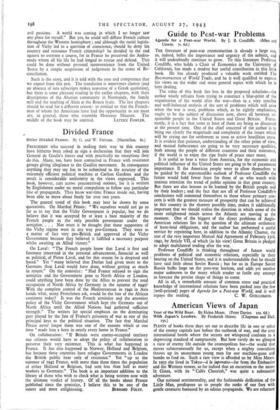Guide to Post-war Problems
Agenda for a Post-war World. By J. B. Condliffe. (Allen and Unwin. 7s. 6d.)
THE literature of post-war reconstruction is already a large one, as, indeed, befits the importance and urgency of the subject, and it will undoubtedly continue to grow. To this literature Professor Condliffe, who holds a Chair of Economics in the University / California, has made a modest but useful contribution in this little book. He has already produced a valuable work entitled The Reconstruction of World Trade, and he is well qualified to express his views on the wider and more general topics with which he is here dealing.
The value of this book lies less in the proposed solutions—the author wisely refrains from trying to construct a blue-print of the organisation of the world after the war—than in a very sensible and well-balanced analysis of the sort of problems which will arise when the war is over, problems which, as he rightly emphasises, ought to be the subject of discussion now, above all between re- sponsible people in the United States and Great Britain. Fortu- nately, it is a fact that some at least of them are being so discussed at the present time. One of the chief concerns of the author is to bring out clearly the magnitude and complexity of the issues which will be crying out for settlement as soon as active hostilities cease. It is evident that patience, understanding of the other point of view, and mutual forbearance are going to be very necessary qualities, both among the people of different countries and their statesmen, if the world is to enjoy the ripe fruits of peace once more.
It is useful to hear a voice from America, for the economic and political influence of the United States are going to be of paramount importance. If the American people were to allow themselves to be guided by the statesmanlike outlook of Professor Condliffe the future would hold fewer fears for those of us who watch with anxious attention the trend of public opinion in that great country. But there are also lessons to be learned by the British people and by their leaders ; and the fact that not all of Professor Condliffe's conclusions will commend themselves to those whose primary con- cern is with the greatest measure of prosperity that can be achieved in this country in the shortest possible time, makes it additionally important that we should realise the direction in which some of the more enlightened minds across the Atlantic are moving at the moment. One of the biggest of the direct problems of Anglo- American relations lies in the question of the ultimate settlement of lease-lend obligations, and the author has performed a useful service by reprinting here, in addition to the Atlantic Charter, the text of the very important Mutual Aid Agreement of February 23rd, 1942, by Article VII, of which (in his view) Great Britain is pledged to adopt multilateral trading after the war.
Professor Condliffe is thinking throughout of future world problems of political and economic relations, especially in their bearing on the United States, and it is understandable that he should have said little about Soviet Russia ; but for us in Europe Soviet Russia bulks large on the post-war horizon, and adds yet another major unknown to the many which render so futile any attempt to forecast the precise shape of things to -come.
All in all, a remarkable amount of common sense and practical knowledge of international relations have been packed into the few (well-printed) pages of Agenda for a Post-war World, and it well repays the reading. C. W. GUILLEBAUD.






















 Previous page
Previous page